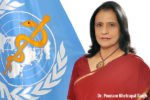Families are the first line of defense in the battle to prevent and manage diabetes –Dr Poonam Khetrapal Singh, WHO Regional Director for South-East Asia
Dr Poonam Khetrapal Singh, WHO Regional Director for South-East Asia, reveals more about prevalence of diabetes in South-East Asia Region and the need to create awareness about the disease
Families that know the signs, symptoms, risks and complications of diabetes are best positioned to prevent the disease and seek medical care to manage it. Health authorities region-wide should harness this capacity given an estimated 91 million people in the WHO South-East Asia Region live with diabetes, with around 49 million unaware of their condition. Undiagnosed or poorly controlled diabetes type 1 and type 2 can cause heart, kidney, nerve and eye damage, as well as premature death.
The importance families have in creating awareness of the risks of diabetes – including overweight and obesity – and in preventing and managing it, is apparent. Families provide a ready-made means to instill healthy habits that last a lifetime, dramatically reducing the risk of diabetes type 2, which accounts for the majority of diabetes cases. They can also help ensure the disease is detected and managed effectively. Doing so will avoid complications and the costs it results in for individuals, families, communities and countries.
As part of the Region’s Flagship Priority of tackling noncommunicable diseases (NCDs) – to which diabetes is a major contributor – Member States Region-wide can empower families to address the disease and enhance health outcomes. That should occur at the same time as increasing access to services for diabetes and other NCDs at the primary healthcare level, as outlined in the Colombo Declaration adopted Region-wide in 2016. There are several ways to do this.
First, health authorities should ensure all families have access to educational resources that help them better understand diabetes. This can be done via social and behavioural change campaigns that emphasise the family unit as a first line of defense, at the same time as highlighting how they can work together to develop healthy habits and diminish the risk of diabetes.
Second – and to enable this – health authorities can work across sectors to increase the access individuals and families have to healthy environments. The creation of green spaces and outdoor gyms in urban areas, for example, can facilitate exercise and the weight management it brings. So too can policies to decrease the amount of sugar and fat in foods and enhance people’s ability to make healthier choices.
And third, all families should have access to affordable diabetes medicines, medical products and care. This starts with ensuring services at the primary level are equipped to detect the disease and that a reliable supply of medicines and medical products used to manage it are on hand. It extends to ensuring those medicines and medical products are affordable to all and are of adequate quality.
Each of the Region’s Member States are dedicated to implementing National Multisectoral Action Plans to tackle NCDs and to prevent, treat and beat diabetes, including by applying the WHO Package of essential noncommunicable disease interventions (WHO PEN) at the primary level. This is commendable. WHO will continue to support all Member States empower families to tackle diabetes head-on, and to ensure all families everywhere can do so effectively.
- Advertisement -



Comments are closed.